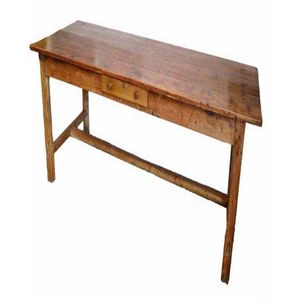19th Century Italian Oak Refectory Table
You must be a subscriber, and be logged in to view price and dealer details.
Subscribe Now to view actual auction price for this item
When you subscribe, you have the option of setting the currency in which to display prices to $Au, $US, $NZ or Stg.
- Stretcher - A horizontal rail which connects the legs of stools, chairs, tables and stands, to provide stabilisation of the legs. A stretcher table is any table with a stretcher base. The term is usually applied to substantial farmhouse tables, although many cabinetmaker's pieces, such as sofa tables, also have turned stretchers.
- Oak - Native to Europe and England, oak has been used for joinery, furniture and building since the beginning of the medieval civilisation. It is a pale yellow in colour when freshly cut and darkens with age to a mid brown colour.
Oak as a furniture timber was superceded by walnut in the 17th century, and in the 18th century by mahogany,
Semi-fossilised bog oak is black in colour, and is found in peat bogs where the trees have fallen and been preserved from decay by the bog. It is used for jewellery and small carved trinkets.
Pollard oak is taken from an oak that has been regularly pollarded, that is the upper branches have been removed at the top of the trunk, result that new branches would appear, and over time the top would become ball-like. . When harvested and sawn, the timber displays a continuous surface of knotty circles. The timber was scarce and expensive and was used in more expensive pieces of furniture in the Regency and Victorian periods. - Refectory Table - A long, substantial, solid-topped table, without leaves or extensions, used as a dining table. They were originally used in the refectories, or dining halls of monasteries, and are found in such places as boarding schools and university halls of residence. The tables usually have heavy turned legs, sometimes connected by stretchers close to the floor, and often have additional supporting legs along the railed frame. The term is also sometimes applied to a much shorter solid-topped table with a somewhat Jacobean flavour of the early 20th century.
This item has been included into following indexes:
Visually similar items

A George III oak refectory table, 76 cm high, 232 cm wide, 82 cm deep

A hardwood refectory table, 20th century, made by Nicholas Dattner, 76 cm high, 216 cm wide, 92 cm deep

An oak French provincial country style dining table, plank top, square section legs, minor wear to the top. 218 cm x 111 cm x 10 cm.

A Continental Oregon pine refectory style, farmhouse table 18th century and later. The table is pegged construction with a stretcher base, single central drawer with turned knob handles. Height 74 cm. Length 228 cm. Width
